We use cookies to make your experience better. To comply with the new e-Privacy directive, we need to ask for your consent to set the cookies. Learn more.
Stone Category FAQs
Sandstone is a sedimentary rock, formed from many years of natural deposits accumulating on the ocean floor, rivers, or lakes. The minerals that comprise sandstone, primarily calcite and quartz, group together and compress. Sandstone is produced over time as the pressure of the minerals develop together.
Sandstone is a reliable building and paving material. It is highly regarded because of its natural decorative characteristics and availability in several impressionable colors. It is ideal for high traffic, residential or commercial spaces and often used for patios, walkways and around pools.
Prestige Stone & Granite currently offers 4 colors of sandstone: Bluestone, Brownstone, Teakwood and Rainbow. Bluestone is the most popular color choice for outdoor landscaping as the blue-grey tones provide distinct aesthetics for your outdoor space.

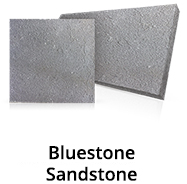
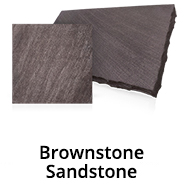
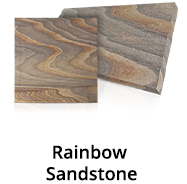
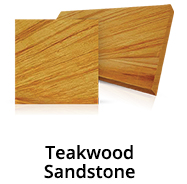
As a natural stone, sandstone will maintain its original look for years longer than manufactured options, but it is always important to properly maintain your outdoor space. Use a soft bristle broom consistently to make sure your space is cleared of debris or dirt. When needed, wet the area, and scrub any buildups on the surface of the stones. Besides sealing natural stones, the easiest way to maintain the look of the stone is to prevent settlement on the surface that can cause staining over time.
Avoid applying acidic based cleaners, such as grout or bathroom cleaners, to your sandstone. Also, stay away from using lemon juice, vinegar, and other multi-purpose cleaning agents. The strong acidic properties of these cleaners are too strong and could end up damaging your stone. Instead, you want to use gentle cleaners and soaps, specifically designed for cleaning natural stone.
If you spill, be sure to clean right away. Do not wipe away the spill, blot it until it disappears and rewash if needed until dry. Do not be afraid to scrub hard on the spot but use a soft bristle brush to avoid damaging the surface.
Ideally you can clean your sandstone without using a pressure washer. If needed, it is advised to use a light pressure wash for stains caused by leaves or moss.
Yes, it is highly recommended to seal your sandstone outdoor space. Discuss with your contractor or installer to determine the best sealer for your space. The sealer you select is specific to the features of your space including grout used, hours of direct sunlight and foot traffic.
Slate is a fine-grained, foliated metamorphic rock that is created by the alteration of shale or mudstone by low-grade regional metamorphism. The color of slate is often determined by the amount and type of iron and organic material that are present in the rock.
Slate is popular for a wide variety of uses such as outdoor and indoor flooring, roofing, and flagging because of its durability and attractive appearance.
Prestige Stone & Granite currently offers Mountain Black slate in tiles, steps, and caps. We are working with customers to expand the current color selection.

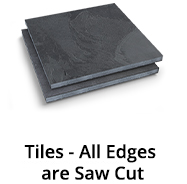
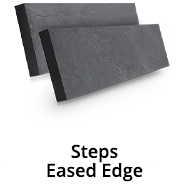
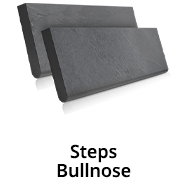
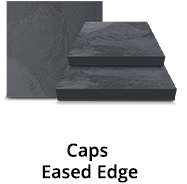
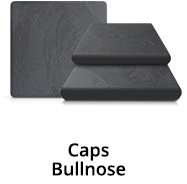
As a natural stone, slate will maintain its original look for years longer than manufactured options, but it is always important to properly maintain your outdoor space. Use a soft bristle broom consistently to make sure your space is cleared of debris or dirt. When needed, wet the area, and scrub any buildups on the surface of the stones. Besides sealing natural stones, the easiest way to maintain the look of the stone is to prevent settlement on the surface that can cause staining over time.
Avoid applying acidic based cleaners, such as grout or bathroom cleaners, to your slate. Also, stay away from using lemon juice, vinegar, and other multi-purpose cleaning agents. The strong acidic properties of these cleaners are too strong and could end up damaging your stone. Instead, you want to use gentle cleaners and soaps, specifically designed for cleaning natural stone.
If you spill, be sure to clean right away. Do not wipe away the spill, blot it until it disappears and rewash if needed until dry. Do not be afraid to scrub hard on the spot but use a soft bristle brush to avoid damaging the surface.
Ideally you can clean your slate without using a pressure washer. If needed, it is advised to use a light pressure wash for stains caused by leaves or moss.
Yes, it is highly recommended to seal your slate outdoor space. Discuss with your contractor or installer to determine the best sealer for your space. The sealer you select is specific to the features of your space including grout used, hours of direct sunlight and foot traffic.
Granite is an igneous rock made up of primarily quartz, feldspar, micas, amphiboles, and a mixture of additional minerals. These minerals and their variation in abundance and alteration give granite the numerous colors and textures available for indoor and outdoor projects. Granite is formed when intense pressure and heat combine under the earth’s mantle, making this natural stone extremely resistant to heat and scratches.
With resistance to heat and scratches, granite is the perfect landscape stone to use on both your indoor and outdoor landscape projects. Granite is extremely durable and maintains its natural beauty after years of use. It is the ideal natural stone for surfaces that receive high traffic and are heavily used, including outdoor patios, walkways, driveways, kitchen countertops and floors.
Prestige Stone & Granite specializes in granite for exterior landscaping projects.
Prestige Stone & Granite currently offers 4 colors of granite: Maple Red, Gold, Grey, and Charcoal. We are consistently adding new colors to our catalog based on demand from customers.

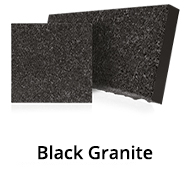
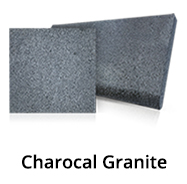
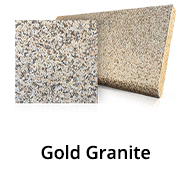
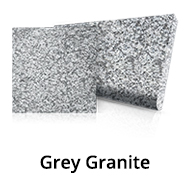
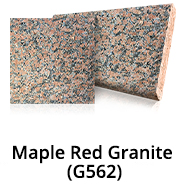
Use a soft bristle broom consistently to make sure your space is cleared of debris. When needed, wet the area, and scrub any buildups on the surface of the stones. Besides sealing natural stones, the easiest way to maintain the look of the stone is to prevent dust and dirt on the surface that can cause staining over time.
Avoid applying acidic based cleaners, such as grout or bathroom cleaners, to your granite. Also, stay away from using lemon juice, vinegar, and other multi-purpose cleaning agents. The strong acidic properties of these cleaners are too strong and could end up damaging your stone. Instead, you want to use gentle cleaners and soaps, specifically designed for cleaning natural stone and granite.
If you spill, be sure to clean right away. Do not wipe away the spill, blot it until it disappears and rewash if needed until dry. Do not be afraid to scrub hard on the spot but use a soft bristle brush to avoid damaging the surface.
Ideally you can clean your granite without using a pressure washer. If needed, it is advised to use a light pressure wash for stains caused by leaves or moss.
Yes, it is highly recommended to seal your granite outdoor space. Discuss with your contractor or installer to determine the best sealer for your space. The sealer you select is specific to the features of your space including grout used, hours of direct sunlight and foot traffic.
Natural thin stone veneer and castle rock are thin cuts of building stone, typically around 1” thick and available in various sizes depending on your project needs. Like building stone, thin stone veneers and castle rock are completely made up of quarried stone and do not include concrete composites.
Natural thin stone veneer and castle rock can be used for everything from interior and exterior building walls to fireplace, chimney, and firepit facades.
Natural thin stone veneer and castle rock are applied to a vertical surface using mortar. The service needs to be correctly waterproofed and prepared before installation. It can be installed professionally or by homeowners with suitable knowledge of working with the material. To extend the lifetime of the product, Prestige Stone & Granite always recommends having a professional install your thin stone veneer and castle rock.
Thin Stone Veneer: Coal Canyon, Arctic White, White Chestnut, Alaska White, Amber Falls, Golden White, Golden Honey, California Gold, Sierra Blue, and Sterling. Castle Rock: Legacy Grey.

As a natural product, the stones will maintain their original look for years longer than manufactured options, but it is always important to properly maintain your thin stone veneer or castle rock installation. To clean your interior or exterior thin stone veneer or castle rock, we recommend using a sponge with warm water and a light soap or detergent. You can use a soft bristle brush but avoid wire bristles.
Avoid applying acidic based cleaners, such as grout or bathroom cleaners, to your stone. Also, stay away from using lemon juice, vinegar, and other multi-purpose cleaning agents. The strong acidic properties of these cleaners are too strong and could end up damaging your stone. Instead, you want to use gentle cleaners and soaps, specifically designed for cleaning natural stone.
For most indoor installations you will not need to seal your stone. For outdoor applications with exposure to the elements, please consult with your contractor for an appropriate sealer.
